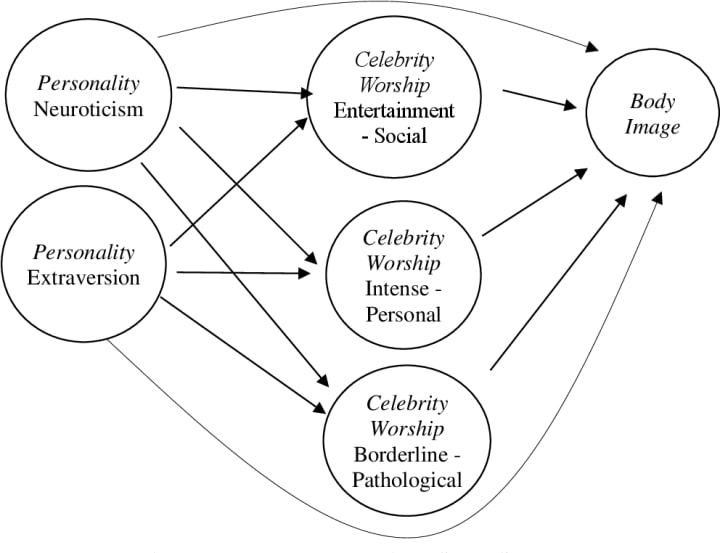Celebrity Obsession: A Psychological Analysis
An examination of celebrity worship syndrome and how it affects us as a society.

A brief psychological synopsis
Celebrity worship syndrome is an obsessive-compulsive disorder in which a person becomes overly involved and interested (i.e., completely obsessed) with the details of a celebrity's personal life.
A person who is "in the public eye" (e.g., authors, politicians, journalists) can be the target of a person's obsession, but research and criminal prosecutions suggest they are more likely to be from the worlds of television, film, and/or pop music.

The term "celebrity worship" (CW) was coined by Lynn McCutcheon and her research colleagues in the early 2000s among academic researchers. However, it is widely assumed that the term "Celebrity Worship Syndrome" first appeared in a Daily Mail article by journalist James Chapman, who was reporting on a study published in the Journal of Nervous and Mental Disease by John Maltby and colleagues titled "A Clinical Interpretation of Attitudes and Behaviors Associated with Celebrity Worship." The Celebrity Worship Scale was used in the study, and CWS was an acronym for it. Chapman also coined the term "Mad Icon Disease" to describe the behavior of such people, clearly a play on the recent news about Mad Cow Disease.
Despite the (ostensibly) unintentional misnomer, the condition could be a symptom of a syndrome (i.e., a cluster of abnormal or unusual symptoms indicating the presence of an unwanted condition). Lynn McCutcheon's team used the Celebrity Attitudes Scale on a small sample of people in the early 2000s and found a single "celebrity worship" dimension. However, Maltby and his colleagues discovered three distinct dimensions of celebrity worship after conducting further research on much larger samples. These were categorized as entertainment-social, intense-personal, and borderline pathological on a scale of one to ten.

• The entertainment-social dimension refers to attitudes in which people are drawn to a celebrity because of their perceived ability to entertain and become the social focal point of conversation with others who share similar interests.
• People with intense and compulsive feelings about a celebrity are associated with the intense-personal dimension.
• People with borderline-pathological symptoms exhibit uncontrollable behaviors and fantasies about celebrities.
Maltby and colleagues have now published several papers on celebrity worship and discovered a link between the pathological aspects of CWS and poor mental health in UK participants (i.e., high anxiety, more depression, higher stress levels, increased illness, and poorer body image). The majority of these studies have been conducted on adults. However, studies on body image have included adolescents, and it has been discovered that among females aged 14 to 16, there is a link between intense-personal celebrity worship and body image (i.e., those teenage girls who identify with celebrities have much poorer body image compared to other groups studied). Maltby's team's research also appears to show that the most celebrity-obsessed people have high levels of dissociation and fantasy-proneness.
Maltby summarized his team's research in an interview with the BBC. He stated:
"Data from 3,000 people revealed that only about 1% had obsessional tendencies. Around 10% (who are neurotic, tense, emotional, and moody) showed a strong interest in celebrities. Around 14% said they would make an extra effort to learn more about their favorite celebrity and socialize with others who share their interests. The other 75% of the population is uninterested in the lives of celebrities. The vast majority of people can name a favorite celebrity, but they don't say they read about or think about them all the time. It's fine, like most things, as long as it doesn't take over your life. "
The same article sought additional scientific perspectives from a biological standpoint. They stated:
"According to evolutionary biologists, it is natural for humans to look up to people who have achieved success in society. This would have meant respecting good hunters and the elderly in prehistoric times. However, because hunting is no longer a necessary skill and longevity is more widely available, these qualities are no longer held in high regard. Instead, we look to celebrities, whose fame and fortune we aspire to. "It makes sense for you to rank individuals according to how successful they are at the behaviors you are trying to copy," evolutionary anthropologist Francesco Gill-White of the University of Pennsylvania in Philadelphia told New Scientist. "Whoever is getting more of what everyone wants is probably using above-average methods." Dr. Robin Dunbar, an evolutionary biologist, disagrees."
Maltby and colleagues' research also shows that CW affects more than a quarter of the people they surveyed, rather than just adolescent females (across the three levels mentioned earlier). According to their paper, CW had both positive and negative consequences. Celebrity worshippers were more optimistic, outgoing, and happy for entertainment and social reasons. Those who idolized celebrities for personal reasons or were more obsessed with them were more depressed, anxious, solitary, impulsive, anti-social, and troublesome.

We have had an unhealthy obsession with celebrities since the beginning of time, and it has taken a dark turn since then.
Celebrity worship, as part of a broader obsession with entertainment culture, has infiltrated almost every aspect of modern life. Although fascination with celebrities can be traced back to antiquity, modern manifestations of this fascination have grown in tandem with the development of consumer culture and the growth of the entertainment industry.
But what accounts for this fascination with celebrities? Is it a good thing that celebrities have so much appeal for so many people? A fair amount of research suggests that a fascination with celebrities stems from self-consciousness and social needs. In some cases, people may be drawn to celebrities to alleviate chronic feelings of inadequacy or emotional distress.

Others, on the other hand, maybe drawn to celebrities as part of a more basic human need to seek out, form, and maintain social connections.
Such people are said to be suffering from the "empty" self and their social" self.
People are too enthralled with celebrities at this deep level of celebrity worship, possibly to the exclusion of real-life friends and activities.
The Empty Self

The empty self emerged in the Western world in the latter half of the 20th century as a result of a combination of demographic, economic, sociocultural, and psychological factors. In the 1920s, the marriage of the disciplines of advertising and psychology resulted in the widespread adoption of the lifestyle solution, which prescribes the use of consumer products to help solve life's problems by offering remedies for undesirable conditions such as poor relationships and a variety of health and hygiene requirements.
Over time, the development of an independent secular personality has been prioritized over religious character and a clear set of internal values. This has resulted in a version of the self that is too individualistic, independent of others, narcissistic, and isolated for some people, resulting in a loss of shared communal values and meaning, values confusion, depression, lower self-esteem, and relationship problems. The empty-self has a chronic, nebulous emotional need that he or she tries in vain to fill by engaging in activities such as unending consumption of material goods, drug and food addictions, serial romantic relationships, and even an unjustified fascination with political figures and celebrities.
Although no empirical research was conducted to support the "empty self" hypothesis, other research provides strong evidence that it was correct. Celebrity worship and compulsive buying tendencies have been consistently linked to lower psychological well-being, including a lack of self-concept clarity and a proclivity for boredom. Personal celebrity worship has also been found to predict the likelihood of elective cosmetic surgery. According to some research, there has been a cultural shift over time, with more books, television shows, and song lyrics featuring narcissistic behavior, as well as generational increases in narcissism.
Recent comprehensive reviews of materialism research have found strong relationships between materialism and negative outcomes such as lower personal well-being, lower life satisfaction, relationship problems, and even poorer physical health. There is also evidence that materialism among young people is increasing over time.
Materialism was associated with the desire to be free of negative emotional states and that materialism is thought to be motivated by a desire to construct and maintain identity, such as increasing self-esteem or fostering belongingness and acceptance by others.
The Social Self

We, humans, are social beings who require close, supportive contact with others for our mental and physical health. We have a need to belong, which necessitates ongoing positive relationships with others who care about us, and we naturally gravitate toward others and enjoy positive social interaction. These social tendencies are thought to be genetically engrained or wired in and necessary for survival, according to evolutionary theory.
Celebrity interest can be viewed as a natural result of this need for social connection. Celebrities are frequently portrayed as attractive and wealthy, with glamorous, exciting lives, as opposed to fans' more mundane, dull existence. The celebrity news cycle runs 24 hours a day, and information about celebrities' lives and work pervades everyday life. This also creates a compelling narrative, which increases public interest in celebrities.
The most popular leisure activity among Americans, English, and citizens of other European countries is becoming absorbed in imaginary experiences and social worlds provided by television, movies, books, and video games that typically feature celebrities.
It has been demonstrated that social needs can even be met through the use of symbolic social surrogates. Social surrogates include social worlds, which are stories or narratives that people experience, both fictional and actual, such as movies, books, and television shows; prosocial interaction, which is a one-sided relationship with a celebrity or fictional character; and artifacts or products, such as pictures, favorite foods from one's past, and Facebook status updates that remind people of others.
Recent critics have frequently blamed celebrity and entertainment culture for moral decay, loss of values, and cognitive decline. We are also far too easily distracted from truly important events.

People with low self-esteem have been shown to improve their self-concept by recalling a favorite celebrity. Similarly, participation in a favorite television show has restored a sense of social connection in people who feel rejected. Participation in fictional narratives can also enrich fans' lives by fostering empathy and social skills.
From an evolutionary perspective, prosocial relationships with both actual and fictional mediated personalities are to be expected from an evolutionary standpoint, and in most cases, these non-reciprocal relationships are adaptive in helping people meet social needs for safety and security. Extensive interviews with fans of various celebrities over several decades have led her to the conclusion that prosocial relationships with either actual or fictional celebrities can be successfully integrated into fans' normally functioning social lives, though such relationships result in intense-personal celebrity worship for an estimated 15–20 percent of fans, which may be more problematic. For this subset of fans, the attraction to celebrities is more likely to be motivated by an empty self.
Other factors contribute to the ease with which fans connect with celebrities. We have the same emotional reactions to fictional events as we do to real events, and while the former may be a little weaker, they are still real emotions. According to evolutionary theory research, people's brains have not evolved sufficiently to have different emotional reactions to fictional characters versus actual acquaintances.
According to Satoshi Kanazawa's Savanna Principle, the brain cannot understand and process events and situations that differ from how they were in the ancestral environment. As a result, media portrayals of celebrities are difficult to distinguish from actual encounters with people. Kanazawa speculates that people with lower intelligence may have a more difficult time distinguishing between their real friends and the characters they see on television.
Social Media

However, new research on social media shows that fans and celebrities can have real, non-prosocial relationships. Fans who communicate with their favorite celebrities via Twitter feel a more personal connection. Celebrities who tweet frequently reveal more candid personal information and can create feelings of closeness with fans in addition to managing their image, though in some cases, the celebrity may not be the one managing the Twitter account. Lady Gaga has cultivated a large and devoted fan base known as Little Monsters through a variety of social media platforms. Her website provides access to her concert tickets and music, as well as a forum for fans to communicate with her (on occasion) and with one another, as well as to explore personal interests.
Because of the increased use of social media to communicate with celebrities and the rise of reality television, Joshua Gamson proposes that the most important trend in celebrity culture in recent years has been that celebrities have become more ordinary and accessible, while many ordinary, unexceptional people have become famous.
Celebrities can use social media to reveal intimate, mundane, and behind-the-scenes aspects of their lives. Social media can even assist fans in achieving their desired level of celebrity, which has become the primary goal of many young people in recent years. Fans who are more interested in celebrities have also been found to be more active on social media. Reality shows, on the other hand, typically highlight ordinary people and offer a quick path to fame.
Celebrities are also popular due to strong cultural forces. In the United States, the media and entertainment industry is worth more than $700 billion, and it is expected to exceed $800 billion by 2021. The global market was valued at $1.72 trillion in 2015, and it is expected to reach $2.14 trillion by 2020. As a result, it should come as no surprise that entertainment themes dominate much of what we think about and do in our daily lives. We appear to have an insatiable appetite for all forms of entertainment, and the industry is more than happy to oblige.
Celebrity and entertainment culture critics appear to be becoming more accurate with each passing year and we've become too preoccupied with "pseudo-events," which is defined as "interesting but meaningless dramas concocted by public relations agents that distort reality and emphasize imagery and emotional reaction over logical and rational reflection." Fake videos are becoming increasingly indistinguishable from videos of real people and events as video technology advances.
According to Neil Postman, Aldous Huxley's Brave New World more accurately predicts modern cultural changes than George Orwell's 1984. While Orwell's dystopia was oppressive and overly controlling, Huxley's alternative depicted a more subtle and seductive subjugation, according to Postman. Huxley portrayed a society obsessed with trivia and lulled into complacency by unending pleasure and entertainment.
More recent critics continue to blame celebrity and entertainment culture for moral decay, loss of values, and cognitive decline. We are also far too easily distracted from important events. Postman forewarned, "There are two ways in which a culture's spirit can become shriveled. In the first, Orwellian version, culture becomes a prison. Culture becomes a burlesque in the second, Huxleyan, paradigm." There is probably no way to completely disconnect from the effects of celebrity and entertainment culture at the moment. To try to keep a better perspective on these effects, we might remember an adage: "Keep your celebrity friends close, but keep your real friends closer."
Celebrity worship remains an addiction from which no one can recover, and obsession can result in stalking and the death of a celebrity and their loved ones.
We will never understand celebrity worship as a society because of the entertainment industry's contrasted brainwashing and social media addiction.
I've accepted the reality of celebrity worship and the numerous dangers it can cause. Because you can't change someone who is too far along in their obsession but you must intervene before it's too late to save them.
About the Creator
Deana Contaste
I enjoy writing poetry, stories, and creating art in general, but I also try to survive in the world like every other human being.






Comments
There are no comments for this story
Be the first to respond and start the conversation.